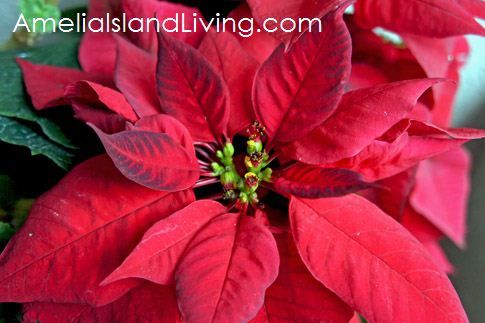
Garden Talk Q & A
QUESTION: I have heard I have to put my poinsettia in a dark closet before it will change color. Is this true? EM
JORDI: You are the second person to ask me this very same question. I suppose this idea has come about because plant nurseries and growers manipulate the light environment by placing the plants under cover. This will force the poinsettias to change color earlier making them available for stores to sell during the holidays.
Poinsettias are native to Mexico, so you can imagine they are exposed to plenty of sunlight on a regular basis. The bracts or specialize leaves change color once the days become shorter as this marks the beginning of cooler temperatures and reduced sun exposure.
It is not necessary to put poinsettias in complete darkness but it is important to keep them away from night lights once October arrives. If the plants are exposed to bright night lights such as street lights, the bracts will stay green. If grown in pots, do not let the roots sit in water as they will easily decay. These plants prefer moist but well-drained soil. Fertilize in small increments from May through September.
Cut the stems down to about 12 to 18 inches from the ground after the fear of frost if over. You may need to cut them a few times during growing season to keep them short and full but stop pruning after September 10. The fancy hybrids do not grow as easily as the standard red ones.
One other quick note – poinsettias are not poisonous to humans or pets. Some people may have a skin reaction if exposed to the white sap found in the stems. For more complete information, and further details about establishing poinsettias in your outdoor landscape in Florida, look at this University of Florida publication
QUESTION: I will be bringing my plants indoors. I have heard it will help to add aspirin to the soil to help prevent disease. Is that true? BM
JORDI: I was unable to find any research information regarding adding aspirin to soil to prevent plant disease. There is extensive research which documents aspirin provides no benefit if added to the water of cut flowers.
I see no reason to add an anti-inflammatory chemical to the soil of any plant. I would be more concerned about one of my pets finding the pill attractive and it potentially causing problems for the animal.
When bringing plants indoors when they are normally outside, let us consider a few important things. This will be a major change for the plant regarding air circulation, water and light exposure. Keep the plant in as similar a light exposure as possible. Avoid over watering as this can potentially kill any house plant. Winter is the dormant season for most plants therefore consider delaying any fertilizing until it is time to put the plant back outside.
If the plant develops leaf spots or browning, consider bringing it to one of our plant clinics for an examination. We can determine if the problem is caused by a disease pathogen or an insect and then prescribe the appropriate mode of action. We are eager to help you take care of your plants so check out the plant clinic dates and times listed on the Nassau County Extension website.
________

County Extension Director
UF/IFAS Environmental Horticulture
Nassau County Extension
543350 U.S. Highway #1
Callahan, FL 32011
904 491-7340 or 904 879-1019